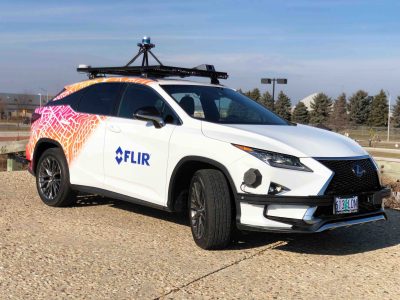Through the partnership, FLIR’s Boson-based thermal sensing technology will improve safety for a leading global automaker’s autonomous vehicles.

Through a partnership with tier-one automotive supplier Veoneer, FLIR’s Boson-based thermal sensing technology will be part of a leading automaker’s level-four autonomous vehicle (AV) sensor suite. The Veoneer system will be the first in the industry to include multiple thermal sensing cameras with narrow and wide field-of-view capabilities.
Veoneer selected the FLIR technology for its production contract with a top global automaker, planned for 2021.
Adding thermal cameras to autonomous vehicles improves safety when the systems are driving in low-visibility and high-contrast conditions, such as nighttime, dusk, sunrise, when facing direct sun or headlight glare, and in challenging weather conditions such as fog, said Mike Walters, FLIR’s vice president of micro camera product management. Other common driverless car sensors, including cameras, radar and LiDAR, don’t work as well in these situations. Integrating thermal cameras improves reliability and redundancy, allowing the vehicles to make better decisions in these challenging conditions.
“It gives the autonomous vehicle the ability to see very well at night because the scene is illuminated from the heat in all the objects in the world around it, especially the things we don’t want to hit most like people” Walters said. “Thermal greatly improves the perception of the autonomous vehicle, and this makes the vehicle safer in real world operational conditions like sunrise, sunset and fog.”
While this is FLIR’s first autonomous vehicle contract, Walters said they’re talking with several other companies that are interested in adding thermal cameras to their vehicles because they “understand the value of increased perception.” Many are moving to fleet deployments, and he expects thermal to be part of their sensor suites.
“As the automotive industry undertakes the enormous technical challenge of building safe autonomous vehicles, cutting-edge sensing technologies, including thermal, are needed to save lives and provide greater situational awareness in all conditions,” said Frank Pennisi, the president of FLIR Systems’ Industrial Business Unit, according to a press release. “FLIR’s automotive-qualified thermal sensing cores are a key component of Veoneer’s thermal sensing cameras and systems, which have proven effective on hundreds of thousands of passenger vehicles to date. This selection shows the value of thermal sensing for self-driving applications, paving the way for future adoption by other automotive manufacturers.”

